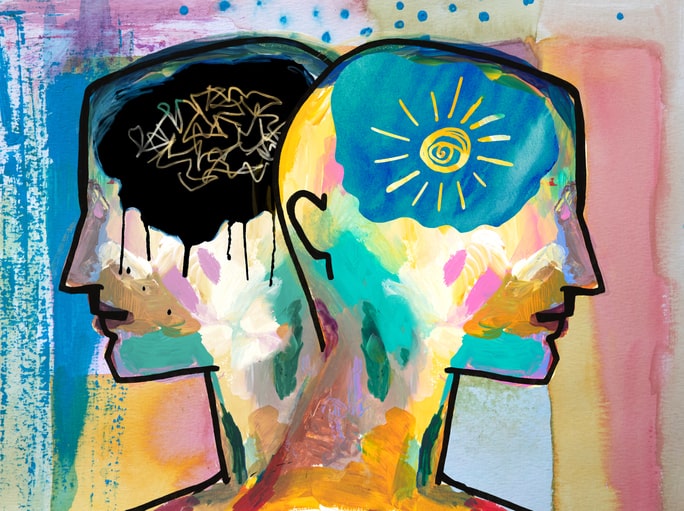Many factors play a role in our path forward, such as our core motivation, purpose, drive, desires, successes, and failures.
How our journeys unfold with unique experiences may be sprinkled with some highs and lows and messiness in the middle. Our interpersonal relationships may also change where some connections deepen and grow stronger, and others fade away or get replaced by new ones.
Throughout your life, there will always be one constant—YOU.
That is why awareness, understanding, and trusting yourself are paramount to living more congruently. It can be difficult, especially when you experience a “yin and yang” pull between your inner essence and what you show to the world.
In creating his masterpiece, “David,” Michelangelo professed:
“I created a vision of David in my mind and simply carved away everything that was not David.”
Similarly, when you commit to “inner work” and chip away at your external façade, you may feel at odds with yourself, struggling between opposing views and torn between what actions to take. For example, you might sense “A part of me wants to do X, and a part of me wants to do Y,” or “I’m damned if I do, and damned if I don’t.”
Navigating challenges that impact progress and advancement.
Your thoughts can turn into habitual behaviors stemming from conscious or unconscious motivations resulting from conditioning, wounds, or other strategies that protected you or helped you achieve or attain relief in a given situation.
Some common ones correlate with self-confidence and self-regard. In Multi-Health Systems’ Emotional Quotient (EQ) Inventory, self-regard is defined as “respecting oneself while understanding and accepting one’s strengths and weaknesses.”
When you lack self-regard, patterns can arise in your system, pushing you to be a certain way or to doubt yourself. You may procrastinate or place false expectations on yourself for how something “should” be done and believe everything must be perfect before moving ahead. Other times you may become defensive, and avoid, or push off work onto others, deferring accountability.
All of these behaviors are rooted in some kind of worry or fear, like being criticized, shamed, rejected, or controlled by someone else.
A shift in mindset begins with new concepts.
The more “real” you get with yourself and focus on what lights you up, the easier it is to start to let go of limiting beliefs and replace them with strategies that support the direction you’re headed.
Here are some ways to expand your thinking and Harness your YOU-Ness:
Gain a fresh perspective.
Gather information from a variety of sources and apply sound methods of evaluation. The Myers-Briggs® “Zig Zag Process” is a type-based approach that can support you in making better choices and problem-solving. By using all four of the MBTI® functions in a specific order—Sensing, Intuition, Thinking, and Feeling—and not just your preferred ones, you can make sure you’re considering all aspects of a situation.
Embrace how you feel.
Check-in regularly with your heart, mind, and body, and process your emotions versus ignoring them, pushing them away, or working around them. By accepting them for what they are—rational or irrational thoughts—you can learn more about what triggers you and address underlying issues before they become problematic.
Tap into your “emotional intelligence” skills.
Managing your emotions effectively while being aware of the energy and vibe flowing in the environment are proficiencies you can cultivate. With practice and discipline, you can bolster your communication approach and executive presence, accentuating your assets by expressing yourself more clearly and addressing challenges upfront.
Align your internal and external worlds.
Self-regulation includes understanding and accepting what you want, as well as what you need, while managing your responses. Often there can be a disparity between what you physically need and what you think you need. As you acknowledge and integrate all aspects of yourself, you can create more balance between who you are and how you show up, minimizing the strategy of “covering up” to blend into mainstream expectations.
Befriend your “inner critics” as mentors and champions.
When we perceive a situation as a threat, our sympathetic nervous system goes into overdrive, activates our automatic reflexes, and our survival instincts kick in. In these moments, your “inner critic” may jump in to tell you what you “should” or “shouldn’t do.” Its efforts are based on old ways it helped you in the past. The more you appreciate its efforts and see it for what it is, the more you can view the “voice(s)” as an internal consultant looking out for you, taking what it shares under advisement.
Our thoughts, feelings, and actions are all interconnected.
Self-leadership is about getting to know yourself better and applying that knowledge to how you connect with others. As a lifelong student, certified professional coach, and consultant, activating the best in others through self-leadership, interpersonal relations, and team dynamics are passions of mine. My approach is personalized and customized, tapping into various assessments, disciplines, modalities, and techniques. To learn more, schedule a call with me.

